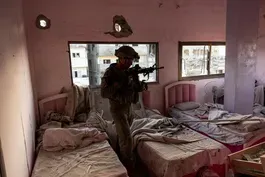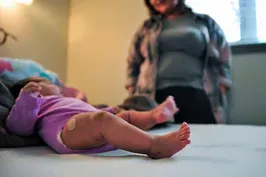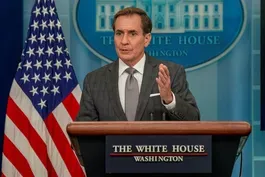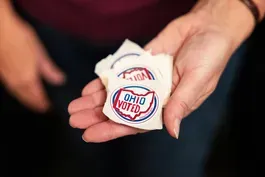
West Bank Palestinians try to save homes
Clip: 11/8/2023 | 7m 36sVideo has Closed Captions
West Bank Palestinians try to save their homes from Israeli extremists
As the war rages between Hamas and Israel in Gaza, some Palestinians in the West Bank are trying to save their homes. Some of the most extreme Israeli settlers there have been clashing violently with their neighbors, forcing them to flee. Leila Molana-Allen reports from near the city of Hebron in the southern part of the West Bank.
Problems with Closed Captions? Closed Captioning Feedback
Problems with Closed Captions? Closed Captioning Feedback
Major corporate funding for the PBS News Hour is provided by BDO, BNSF, Consumer Cellular, American Cruise Lines, and Raymond James. Funding for the PBS NewsHour Weekend is provided by...

West Bank Palestinians try to save homes
Clip: 11/8/2023 | 7m 36sVideo has Closed Captions
As the war rages between Hamas and Israel in Gaza, some Palestinians in the West Bank are trying to save their homes. Some of the most extreme Israeli settlers there have been clashing violently with their neighbors, forcing them to flee. Leila Molana-Allen reports from near the city of Hebron in the southern part of the West Bank.
Problems with Closed Captions? Closed Captioning Feedback
How to Watch PBS News Hour
PBS News Hour is available to stream on pbs.org and the free PBS App, available on iPhone, Apple TV, Android TV, Android smartphones, Amazon Fire TV, Amazon Fire Tablet, Roku, Samsung Smart TV, and Vizio.
Providing Support for PBS.org
Learn Moreabout PBS online sponsorshipGEOFF BENNETT: As the war rages between Hamas and Israel in Gaza, some Palestinians in the West Bank are trying to save their homes.
Some of the most extreme Israeli settlers there have been clashing violently with their neighbors, forcing them to flee.
Leila Molana-Allen reports from near the city of Hebron in the southern part of the West Bank.
LEILA MOLANA-ALLEN: Mournful sighs and the ache of hopelessness.
These Palestinian bedouins are packing up and leaving Khirbet Zanuta, a herding village in the south Hebron hills that they have called home for generations.
Israelis from settlements nearby have long harassed the villagers in this area, hoping to force them out.
But since the October 7 Hamas attacks, the pressure has become unbearable.
Sana'a and her three young kids live in the house closest to the settlement, which sits atop the next hill.
They're the first port of call for attacks.
SANA'A MAKHARZA, West Bank Resident (through translator): Every day, day or night, the settlers come to us.
They shoot at us.
The children are terrified.
The kids can't sleep and neither can we.
And when the dog howls, we know that the settlers have come again.
LEILA MOLANA-ALLEN: The villagers here say that settlers came and cut their electricity wires, stabbed through their water tanks with knives, and smashed their solar panels, cutting out all their essential resources.
SANA'A MAKHARZA (through translator): They destroyed our spirit.
We can't live or eat.
Even the school is closed.
This is not life.
It's too hard.
LEILA MOLANA-ALLEN: Of Khirbet Zanuta's 300 residents, more than half have already fled.
By the end of the week, it will be empty.
Sana'a's family are one of the last to leave.
There's no place for their flock to go.
But, in despair, they have finally given up.
SANA'A MAKHARZA (through translator): We tried to survive it, but we can't.
And after displacing our village, they will displace the rest of these villages.
LEILA MOLANA-ALLEN: Sisters Dima and Tala (ph) on 9 and 10.
They grew up in this quiet farming community.
Most of their friends and neighbors have left.
Now their family is packing up too.
DIMA, West Bank Resident (through translator): We're terrified of them, and so are my brothers and cousins.
We are so sad that we have to leave our homes.
LEILA MOLANA-ALLEN: Asser and the other village elders tried to ask for security forces for help, but were turned away, knowing that, if they fight back, they will be arrested or even shot.
Seeking legal protection was their last chance.
After a lifetime of defending their land here by simply refusing to leave, this battle is lost.
ASSER SHAFI GAZAL, West Bank Resident (through translator): In Gaza, people are dying from the bombing.
Here, we die every day, every day.
Every day, we die.
LEILA MOLANA-ALLEN: As the IDF pulls large numbers of soldiers away from West Bank posts to fight in Gaza, local settlers have stepped in to fill the security vacuum, often with state backing.
Israeli peace activists have turned out to help, hoping the presence of Israelis may provide a little protection for the farmers.
There's not much they can do.
Kobi Snitz came here from Tel Aviv after colleagues told him what was happening.
He's visited these villages for years, but the change he's seen in the past few weeks came as a shock.
KOBI SNITZ, Israeli Peace Activist: Army response is nearly nonexistent.
The police are not very interested in protecting Palestinians.
And to make things worse, the army has deputized large numbers of violent settlers, handed out guns to them and uniforms.
And it's pretty much a gray area which settlers are actually formerly army and which just have a gun and some uniform and have made themselves local sheriffs.
LEILA MOLANA-ALLEN: Forty percent of the West Bank, mostly in urban areas and refugee camps, is defined as under the authority of the Palestinian government.
But the other 60 percent is disputed.
The international community says it's illegal for Israelis to build there.
Israeli settlers and increasingly the Israeli government reject that.
Displacement is not just a humanitarian issue, but a political one.
Any hope of a two-state solution relies on land in the West Bank becoming a Palestinian state.
As more and more Palestinian communities here disintegrate and are replaced by Israeli towns, that potential path to peace is closing.
Israeli advocacy group B'Tselem documents human rights violations against Palestinians in the occupied West Bank.
SARIT MICHAELI, B'Tselem: The West Bank is an area under Israeli occupation.
And this means that Israel is obligated to protect the rights of Palestinians in the West Bank.
But what Israel is doing is the exact opposite.
And, very often, the government agents like soldiers and police are actually actively involved in this forceful transfer.
This is a war crime.
LEILA MOLANA-ALLEN: What is your evidence that the Israeli government, the Israeli military has been directly complicit?
SARIT MICHAELI: When you see settlers and soldiers rampaging through communities together, when the Israeli security forces, the army, the police, stand by and sometimes support these forcible transfer acts, it's not just the actions of these crazy individual criminals.
Settler violence is a major informal tool that Israel uses to take over Palestinian land in the West Bank.
LEILA MOLANA-ALLEN: Israel's Prime Minister Benjamin Netanyahu said today that extremist settlers must not take the law into their own hands and the government would act against it, but did not elaborate on how.
As Palestinian farmers are pushed from rolling agricultural land towards the relative safety of densely populated urban areas, they're not just losing their homes, but their livelihoods.
The next morning, we visit Sana'a's family after the long drive transporting what they could save over the hills.
MOHAMMAD KHUDAYRAT, West Bank Resident (through translator): There's no food, no water for sheep.
There are no schools for the children, no roads and no infrastructure in this area.
LEILA MOLANA-ALLEN: Some still refuse to leave, in spite of daily threats since the war began.
In nearby Susya, Ahmed Jabir sent his children to a safer area weeks ago.
AHMED JABIR, West Bank Resident (through translator): My two little daughters are always afraid, crying and being sick and telling me, "They will kill us."
We tell the settlers: "You're scaring the children."
And they say: "Shut up.
Don't talk."
LEILA MOLANA-ALLEN: But he won't budge.
This week, the harassment turned into mortal danger when a group of settlers burst into his house at 1:00 a.m. AHMED JABIR (through translator): They put their guns through our heads and told us: "We're giving you 24 hours to leave or we will shoot you."
LEILA MOLANA-ALLEN: Ahmed and his wife fear, if they flee, they will lose their land forever.
They know that, by staying, they could lose their lives.
AHMED JABIR (through translator): We shouldn't leave.
We have to hold on.
They have come every day since the beginning of the war.
Tonight, too, they will come.
LEILA MOLANA-ALLEN: As darkness falls, a tense quiet descends, another emptying village holding on as long as it can.
For the "PBS NewsHour," I'm Leila Molana-Allen in Susya, the West Bank.
America's top diplomat lays out vision for post-war Gaza
Video has Closed Captions
Israel's ground invasion grinds on as Blinken lays out vision for post-war Gaza (5m 11s)
Explaining the staggering rise in babies born with syphilis
Video has Closed Captions
Explaining the staggering rise of syphilis in newborn babies (5m 24s)
How the White House views Israel's military campaign
Video has Closed Captions
How the White House views Israel's military campaign (7m 15s)
Opera Philadelphia pushes forward amid financial uncertainty
Video has Closed Captions
Opera Philadelphia pushes forward amid financial uncertainty (6m 48s)
Reproductive rights drive wins for Democrats
Video has Closed Captions
Reproductive rights drive wins for Democrats, leaving clues for future elections (9m 24s)
Why school board elections are garnering national attention
Video has Closed Captions
Why school board elections are garnering national attention (4m 51s)
Providing Support for PBS.org
Learn Moreabout PBS online sponsorshipSupport for PBS provided by:
Major corporate funding for the PBS News Hour is provided by BDO, BNSF, Consumer Cellular, American Cruise Lines, and Raymond James. Funding for the PBS NewsHour Weekend is provided by...

















